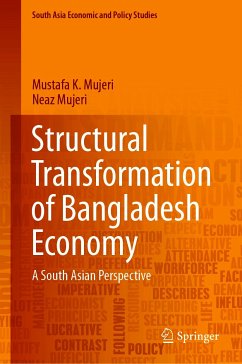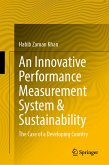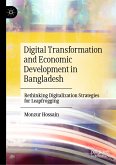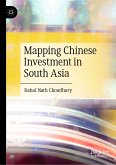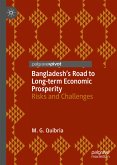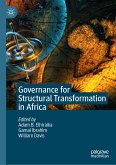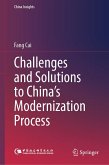This book examines the theory and global evidence on structural transformation along with stylised facts and implications using, among others, a dynamic panel model, for South Asia. The characteristics of the structural transformation process in Bangladesh bring out the relevance of a comprehensive and inclusive South Asian 'brand' in view of the challenges of large population size, high burden of poverty, rising inequalities and its compulsion to achieve rapid and sustained inclusive development.
The analysis highlights several distinct characteristics of Bangladesh's structural transformation including changes in value added, trade, employment, productivity, formal-informal jobs, and opportunities for low-skilled workers. The book suggests that the manufacturing sector could not create the required number of jobs and generate rapid absolute and relative productivity gains in the Bangladesh economy. Although the services sector has largely led output and employment growth, servicessubsectors with strong labour absorptive capacity have low average productivity. Hence, growth-enhancing structural transformation led by these subsectors is likely to be less dynamic than required for rapid employment-creating growth in the economy.
The book's analysis on COVID-19 and cyclone Amphan shows that an integrated disaster and development paradigm is needed for Bangladesh. An inclusive and health and well-being focused structural transformation presents the pathway to advance the people-centred approach to development in Bangladesh through both vulnerability reduction and investments in sustainable development that would offset both known and unknown disaster threats. The key for Bangladesh is to skillfully manage the 'developer's dilemma' of achieving both structural transformation in terms of large productivity gains and inclusive growth for reducing poverty and rising inequalities. This book is relevant to students, academicians and development practitioners and others interested in contemporary development.
The analysis highlights several distinct characteristics of Bangladesh's structural transformation including changes in value added, trade, employment, productivity, formal-informal jobs, and opportunities for low-skilled workers. The book suggests that the manufacturing sector could not create the required number of jobs and generate rapid absolute and relative productivity gains in the Bangladesh economy. Although the services sector has largely led output and employment growth, servicessubsectors with strong labour absorptive capacity have low average productivity. Hence, growth-enhancing structural transformation led by these subsectors is likely to be less dynamic than required for rapid employment-creating growth in the economy.
The book's analysis on COVID-19 and cyclone Amphan shows that an integrated disaster and development paradigm is needed for Bangladesh. An inclusive and health and well-being focused structural transformation presents the pathway to advance the people-centred approach to development in Bangladesh through both vulnerability reduction and investments in sustainable development that would offset both known and unknown disaster threats. The key for Bangladesh is to skillfully manage the 'developer's dilemma' of achieving both structural transformation in terms of large productivity gains and inclusive growth for reducing poverty and rising inequalities. This book is relevant to students, academicians and development practitioners and others interested in contemporary development.
Dieser Download kann aus rechtlichen Gründen nur mit Rechnungsadresse in A, B, BG, CY, CZ, D, DK, EW, E, FIN, F, GR, HR, H, IRL, I, LT, L, LR, M, NL, PL, P, R, S, SLO, SK ausgeliefert werden.

